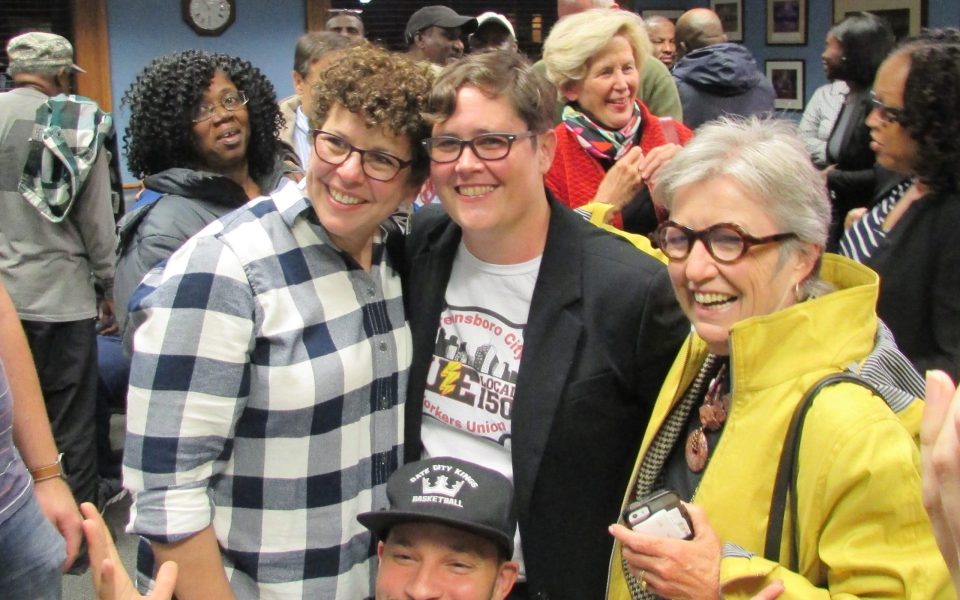Few people anticipated the progressive wave that swept over the electoral landscape last Tuesday.
Beyond the much-heralded Virginia election that saw a gubernatorial candidate who trafficked in Trump-like racial demagoguery go down in flames, not to mention the first out trans person elected to a state legislature and self-described socialists elected to local and state office across the country, major shifts also occurred in North Carolina.
Charlotte elected its first black female mayor, Vi Lyles, while propelling Braxton Winston — whose image standing shirtless and with a raised fist before a row of riot police came to represent the unrest over the police killing of Keith Lamont Scott last year — to city council. Al Heggins, the former human relations director for the city of High Point, won the highest number of votes for Salisbury City Council, which means by custom that she will likely be the city’s next mayor. Only two years ago, Heggins was fired by the city of High Point after city council members raised a stink about a police-community relations forum she organized that employed the term “white supremacy.” Incidentally, Heggins’ chief persecutor, Jim Davis, lost his bid for mayor.
In Greensboro, of course, the two most conservative city council members, both white men, were replaced by progressive women. Tammi Thurm’s unseating of the Tony Wilkins, the only Republican on the board, in District 5 by a 10-point margin was astounding enough. Even more dramatic, Michelle Kennedy, who has earned a reputation for forcefully speaking out against policies that criminalize poverty and enable police abuse, dislodged Mike Barber, a developer-friendly council member who ran for re-election with the backing of the Greensboro Police Officers Association. Kennedy takes office as the first openly gay member of the council and proudly wore a T-shirt on election night to promote the UE Local 150 Greensboro City Workers Union.
And yet, for all the dramatic storylines and eye-popping optics, there’s no guarantee at least in Greensboro that city government will undergo a dramatic transformation.
John Robert Kernodle III, a divinity student at Wake Forest University whose late father served on Guilford County School Board, tempered expectations in an election-night Facebook post.
“Expect a council that will refuse to stick its neck out for civil rights, racial and economic justice, and basically anything that isn’t developer-approved,” wrote Kernodle, a self-described socialist and anarchist. “We may have a couple new council members who are ready and willing to push back on that, but the real work will continue to happen outside of council chambers through the work of ordinary residents organizing and agitating for meaningful change.”
Kennedy will have the opportunity to join incumbents Sharon Hightower and Yvonne Johnson in holding Mayor Nancy Vaughan’s feet to the fire to address the city’s stubborn poverty rate and accelerate the city’s commitment to raise the minimum wage for city workers to $15 per hour. Kennedy, Hightower and Johnson are also the “three reliable votes for police accountability,” as Kernodle observed.
Curbing poverty will be an uphill battle for even the most cohesive and focused council, with structural employment patterns driving a widening wealth gap in cities across the country.
Efforts to reform racial disparities in policing are likely to run into even more resistance. Two years after a New York Times exposé on the Greensboro Police Department, the pressure to reduce arrests for minor offenses and address the over-policing of the black community seems to have abated. Repeated occurrences of apparent police abuses, from the Scales brothers and Dejuan Yourse to Jose Charles and Zared Jones, show no sign of letting up. And when people complain about police mistreatment, they often encounter a confusing and demoralizing bureaucracy with little transparency. In other words, there’s no reason to think longstanding tensions between police and the black community have reached resolution thanks to Kennedy’s election.
Contrasting Facebook posts by Irving Allen and CJ Brinson — two Black Lives Matter organizers whose Greensboro City Council campaigns were cut short in the primary — capture the paradoxical reality of the election.
“Greensboro makes a huge shift on its city council last night!” Allen wrote. “Congrats to Michelle Kennedy and Tammi Thurm for running amazing campaigns in the city. This is where the work begins. Excited about what is possible moving forward.”
Posting with the hashtag #CarryOn, Brinson offered a glass-half-full analysis: “In the midst of white joy, white moderate liberalism, and the perception of a left-leaning Greensboro… black bodies still feel clouds of terror hovering around our existence.”
The contradiction between those two frames likely marks the fissure between two emerging blocs on city council that both call themselves progressive — one that congratulates itself for new hotels and brewpubs and another that cautions us not to forget working families who aren’t getting by or people of color who feel oppressed rather than protected by the police.
Join the First Amendment Society, a membership that goes directly to funding TCB‘s newsroom.
We believe that reporting can save the world.
The TCB First Amendment Society recognizes the vital role of a free, unfettered press with a bundling of local experiences designed to build community, and unique engagements with our newsroom that will help you understand, and shape, local journalism’s critical role in uplifting the people in our cities.
All revenue goes directly into the newsroom as reporters’ salaries and freelance commissions.


While it’s likely that things will not change *too* much, I’m not sure that the warnings of a “self-proclaimed anarchist” really speak to the change.
Wilkins, for instance, was the lone vote in favor of Trudy Wade’s ridiculous General Assembly plan to remake the GSO city council. If a council member can’t support GSO making those sorts of decisions, what good is he? So for that, as well as his lone opposing vote for the resolution against HB2, it’s good that he’s gone.